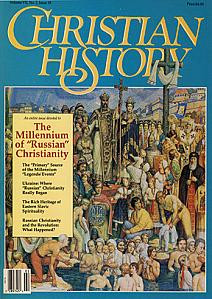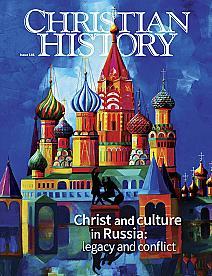MOGILA BROUGHT REVIVAL TO THE EASTERN ORTHODOX CHURCH
[For an image of Mogila (Movila) see https://basilica.ro/calendar-ortodox-22-decembrie/]
NATIONAL CHURCHES go through periods of decay and revival. In the seventeenth-century, Orthodoxy in eastern Europe was in decline. Protestants and Catholics moved into the area to fill the void. The person most instrumental in reviving the Russian Orthodox Church was Peter Mogila.
Mogila was a scion of noble Moldavians. (Moldavia lies between the Ukraine and Rumania.) The young man obtained his training from Jesuits in Poland and mastered several languages, including Latin, the “universal” language in which most of Europe’s scholars still communicated. Despite his Catholic education, Mogila remained fervently Eastern Orthodox. After a stint in the Polish army, he founded a church in the Ukraine and then became a monk in 1625 at Kiev’s famous Monastery of the Caves, founded in the eleventh century by Anthony of the Caves. Two years later, he became head of the community’s recently-established theological school.
His greatest contributions to the revival of his religious tradition would come through education. Although no friend to Roman Catholicism, Mogila was impressed by Western educational methods and introduced them into the school. Elected Metropolitan of Kiev in 1633, he set the school on course to becoming the leading Orthodox academy of all Russia, and indeed of the Eastern Church. A host of Orthodox bishops and seminarians would eventually get their training in theology and the sciences at Kiev. Extending the reach of his reforms, he founded several satellite schools and upgraded the printing presses of his church.
Mogila adopted Latin for the classroom and even wrote his influential Orthodox Confession of the Catholic and Apostolic Eastern Church in Latin. Despite Western influences in this and in his many other writings, their content was strictly Orthodox. The catechism was approved by the four Eastern Orthodox primates. The catechism was “a vindication of Orthodox primacy in doctrine and Church jurisdiction, in opposition to the claims of both Reformers and Counter Reformers,” says the World Biographical Encyclopedia.
Unlike Lutherans who view the eucharist through the teaching of consubstantiation (where Christ is in and under the elements) and Reformed Protestants who see it as a symbolic memorial, Mogila, like Roman Catholics, firmly taught transubstantiation. “In the Moment of Consecration of the holy Gifts, the Priest must firmly and undoubtingly resolve within himself, that the Substance of the Bread, and the Substance of the Wine, are changed into the Substance of the very Body and Blood of Jesus Christ, by the Operation or working of the Holy Ghost...” Unlike Catholics, who still restricted the laity from the cup in those days, Mogila insisted the wine was for all believers.
On the frequently divisive theological issue of faith vs. works, Mogila insisted that while we are saved by faith in Christ, from whom all our hope comes, good works must accompany true faith as fruits come from a good tree; otherwise we are not truly saved. And unlike most Protestants, he taught the necessity of auricular confession to a priest for the forgiveness of sins.
Peter Mogila was more than a scholar. His diplomacy recovered many church buildings and lands that had been taken over by Catholics, including the Saint Sophia Cathedral in Kiev, which he also repaired. Peter Mogila died on this day 22 December 1646 (sometimes given as 31 December because of the difference in Eastern and Western church calendars). For three centuries his theology and writings dominated the Eastern Orthodox Church—centuries known to historians as “the Mogila period.” To this day his influence is felt, although his works have been superseded by modern texts better suited to meet contemporary needs.
—Dan Graves
----------------
Russian Christianity is examined in detail in Christian History #18 The Millennium of “Russian” Christianity







